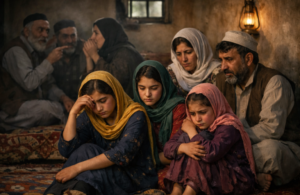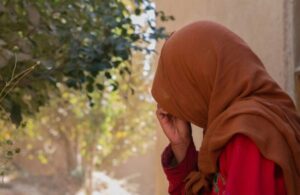MONITORING (SW) – In recent years, Doctors Without Borders/Médecins Sans Frontières (MSF) has been able to improve patients’ experiences of care for drug-resistant tuberculosis (DR-TB), but the changing political situation threatens to derail this progress, writes Anita Mesic, MSF tuberculosis (TB), HIV, and hepatitis adviser.
Below is the article that was originally published in The BMJ.
On my last visit to MSF’s TB hospital in Kandahar, Afghanistan, I watched as a young girl writhed in agony, her short life being snuffed out by TB-meningitis. She had arrived at an advanced stage and there was little we could do, other than make her last moments more comfortable.
Down the hallway, an older man was preparing to leave. Over the course of his care for DR-TB, he’d grown stronger. I remember how proud he was to finally finish treatment.
Two patients with two very different outcomes. One highlighted the challenges that the people of Afghanistan—especially when female—face in reaching care. The other showed what was possible when healthcare providers were able to put the person at the very center of treatment.
The burden of TB and DR-TB is a major public health crisis in Afghanistan, which particularly affects women and children. In Kandahar, for example, more than 60 percent of our patients are women and 25 percent are children under the age of 15.
While the Ministry of Public Health has done amazing work in decentralizing care for uncomplicated forms of TB, access to treatment for drug-resistant forms remains challenging. Decades of national insecurity, together with global disinterest in a disease typically seen as an ailment of the poor, means that access to treatment for DR-TB is limited to five places across Afghanistan.
Grueling treatment regimens
Drug-resistant forms of TB occur when TB medicines are incorrectly used or prescribed, when patients do not properly adhere to their treatment, or when poor quality drugs are used. DR-TB treatment has, until very recently, been extremely trying for patients to undergo. Previous regimens required patients to be away from home for up to 18 months, subject to painful injections, in daily contact with a health worker, separated from their families, and out of work.
These treatments caused multiple adverse reactions, including deafness, kidney damage, and neurological conditions, which made it hard for many patients to follow until the end. In Afghanistan, men must chaperone female patients or caretakers, further straining their family’s income. As a result of these factors, up to 30 percent of patients would drop out of care.
A better experience of care
When MSF began providing DR-TB care in Kandahar in 2016, a key objective was to make TB treatment work better for patients. We knew that many people could not easily access our clinic and could not stay away from home for long periods of time. We wanted more people treated at home, in their own communities, and with shorter oral regimens. Instead of having to undergo grueling treatment away from home, MSF introduced a nine-month oral regimen, in line with World Health Organization recommendations.
This, coupled with the move away from injectables, has enabled people living with TB to follow their treatment plan from home, after a short initial stay in Kandahar for observation, instead of having to be hospitalized or directly monitored for the entire period. We follow up on a weekly basis by phone or, where possible, with community health workers who visit, and the patient only has to be checked in person in Kandahar once a month. Given 60 percent of all people enrolled with us come from outside of Kandahar, this dramatically improves their experience of care.
We also tailor care to the individual person, providing financial, travel, and food support when they do need to stay in Kandahar, as well as counseling. This regimen works: since it was introduced, no patient has dropped out because of it. It shows that shorter and more context appropriate treatment plans improve people’s ability to stay in care.
One of many hardships
However, with the recent change of power, many funders—namely, the US, EU, and the World Bank—have pulled aid, saying they didn’t want it falling into the wrong hands. The consequences of this have been swift, and the malnutrition situation, coupled with the near total lack of affordable health care, is now grave enough to merit a humanitarian intervention. Not wanting to legitimize a government shouldn’t come at the expense of millions of people’s lives.
MSF knows that while TB treatment is critical, it can’t be done in isolation. TB is just one of the many aspects of people’s lives here and one of the many hardships they face. It’s well known that TB thrives among people in poor social and economic conditions, and Afghanistan’s socioeconomic situation is deteriorating rapidly. People cannot adhere to treatment if they are starving. As the context in Afghanistan changes, so too must our approach.
Over the past three months in Kandahar, we’ve seen a growing need for other types of support and so we’ve provided assistance to internally displaced people. We’ve also started providing malnutrition services (something we hadn’t done in Kandahar before), after it became difficult for Mirwais Hospital to cope with growing numbers of malnourished children.
It’s not clear what the next few months and years will look like for Afghanistan. Amid the uncertainty, we are committed to continuing to care for people living with TB and to responding to the other humanitarian and medical needs of people.
We will stay committed to innovation in TB care and to using our position as an independent and apolitical organization to support the National Tuberculosis Control Program. But we cannot be the only organization doing this.
We cannot let the modest improvements made in TB care in Afghanistan be reversed because of a change in government. Other ways to channel humanitarian assistance must be found. At this time, it’s clear that Afghanistan needs more, not less, support.
ENDS






